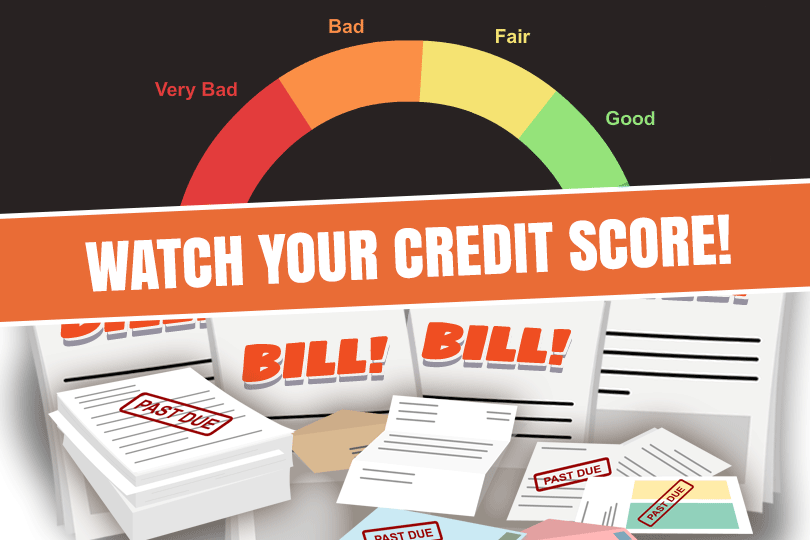What Your Credit Score Says About You
August 23, 2022
What is a Good Credit Score?
Think of your credit score like grades you get in school. A higher grade means that the work you turned in was on time and of higher quality. It measures your academic performance. Your credit score measures your creditworthiness, and you are graded bases on a number of factors, and credit bureaus calculate it on a scale between the range of 300 to 850.
The higher this score is, the more lenders will trust you. A high score represents a borrower who makes repays loans and makes his payments on time, making you less of a risk in the eyes of lenders, giving them more incentive to grant you credit with a lower interest rate.
What Goes into Your Credit Score?
One of the main credit scoring formulas used in the U.S. is the FICO score. All major credit bureaus in the U.S.—Equifax, Experian, and TransUnion—calculate credit scores using FICO's algorithm and information they have collected about people's credit history. It is based on five factors: timely payments (35%), total debt (30%), the age of credit (15%), new credit (10%), and the type of debt (10%). Let’s talk about each of the aspects.
Timely Payments: The first factor is easy enough to understand; to be considered creditworthy, you need to make payments on your loans on time. This can mean making your mortgage payment on time, and even your credit card balance.
Total Debt: Your total debt, which affects 30% of your score, is the amount of money you owe, relative to your credit limits. The more you owe, the riskier it is for you to take on new debt, lowering your credit score.
Age of Credit: Having a longer, more established credit history is advantageous because it gives lenders more information about your spending habits. A longer history of reliable borrowing means your score will be higher.
New Credit: This refers to lines of open credit. If a borrower has opened a number of new credit lines in a short amount of time, it indicates to lenders that they are having financial trouble and cannot manage their money well.
Type of Credit: This is especially helpful for new borrowers who don’t have a long credit history. It helps to have different types of credit lines because it shows lenders that you are able to handle various finances.
While it is good to know what goes into your score, you also need to know what doesn't affect your credit rating. While credit applications can affect the score, "soft" credit checks do not. The score is not based on sex, race, marital status, religion, nationality, or age. Information about where you live, your job, salary, or the interest rates on your credit accounts is not factored into the score either.
------------------------------
RELATED VIDEOS:
You're Almost There When You Get Your Loan Approval
Learn About the Mortgage Insurance Premium (MIP)
Pre-approval Starts the Mortgage Process

FHA Loan Articles
December 4, 2024When you think about owning a farm, do you dream of vast landscapes and thriving agricultural enterprises? Or are you looking for a quaint farm-style house to live in but not necessarily to start a new farming career?
Borrowers who want to buy a farm residence are in luck with the FHA loan program, which includes options to purchase farm residences.
November 27, 2024If you are new to the home loan process, you may wonder how your loan officer will interpret your application data. How lenient is the lender with issues related to debt, credit utilization, and related factors? We examine some key points, but remember that what follows is not financial advice. Always consult a finance or tax professional for the most current information.
November 26, 2024
Thinking about buying a home? One of the first things you'll want to consider doing is filling out forms to be pre-approved for your FHA mortgage. This means a lender takes a look at your finances to figure out how much they're willing to loan you. It's a smart move, but you might be wondering: "Will applying for pre-approval hurt my credit score?"
November 25, 2024FHA mortgages include a refinance option that allows you to pull equity from your home in cash. The FHA cash-out refinance loan allows the borrower to take the difference between what remains to be paid on the home and the amount of equity built up.
The FHA loan program has some competition in this area, but how do your other government-backed refinance loan options measure up?
November 21, 2024The dream of homeownership is with some from a young age. But in an uncertain housing market, some grapple with the question: Is buying a home the right move for me?
While renting offers relocation flexibility and lower upfront costs, homeownership provides a wealth of financial and personal benefits.







